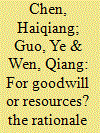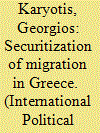| Srl | Item |
| 1 |
ID:
182724


|
|
|
|
|
| Summary/Abstract |
This paper investigates the impact of economic policy uncertainty (EPU) on the corporate philanthropy (CP) behaviors of firms using a dataset from Chinese A-share listed firms. We find that, on average, firms decrease their CP significantly when economic policy uncertainty increases, but the response is heterogeneous for firms with different ownership types. Compared with their counterparts, private firms are willing to contribute more donations in an environment with high economic policy uncertainty. Further analysis shows that private firms take on more other types of corporate social responsibility at the same time, and private firms' additional CP in a high EPU environment is rewarded with more subsidies, indicating that altruistic and political motives may play important roles in driving the CP behaviors of private firms. There is no evidence that private firms selling products directly to consumers are more likely to engage in additional CP. Our findings indicate that the main motivation behind Chinese private firms' additional CP under high economic policy uncertainty is seeking more government resources, instead of keeping consumers loyal by maintaining good reputations during hard periods.
|
|
|
|
|
|
|
|
|
|
|
|
|
|
|
|
| 2 |
ID:
130912


|
|
|
|
|
| Publication |
2012.
|
| Summary/Abstract |
The field of security is largely controlled by elites who, by virtue of their authority, are able to create an image of an enemy which is largely independent of the objective significance of a threat. However, a narrow focus on speech acts and discourse analysis to study such processes of securitization is inherently inadequate. This article provides a panoramic account of Greek migration politics during the 1990s. It shows that securitization can be discursive or nondiscursive, pre-mediated or subconscious, and beneficial or detrimental for securitizing actors. Elite interviews and an in-depth analysis of contextual factors help make sense of these dynamics
|
|
|
|
|
|
|
|
|
|
|
|
|
|
|
|